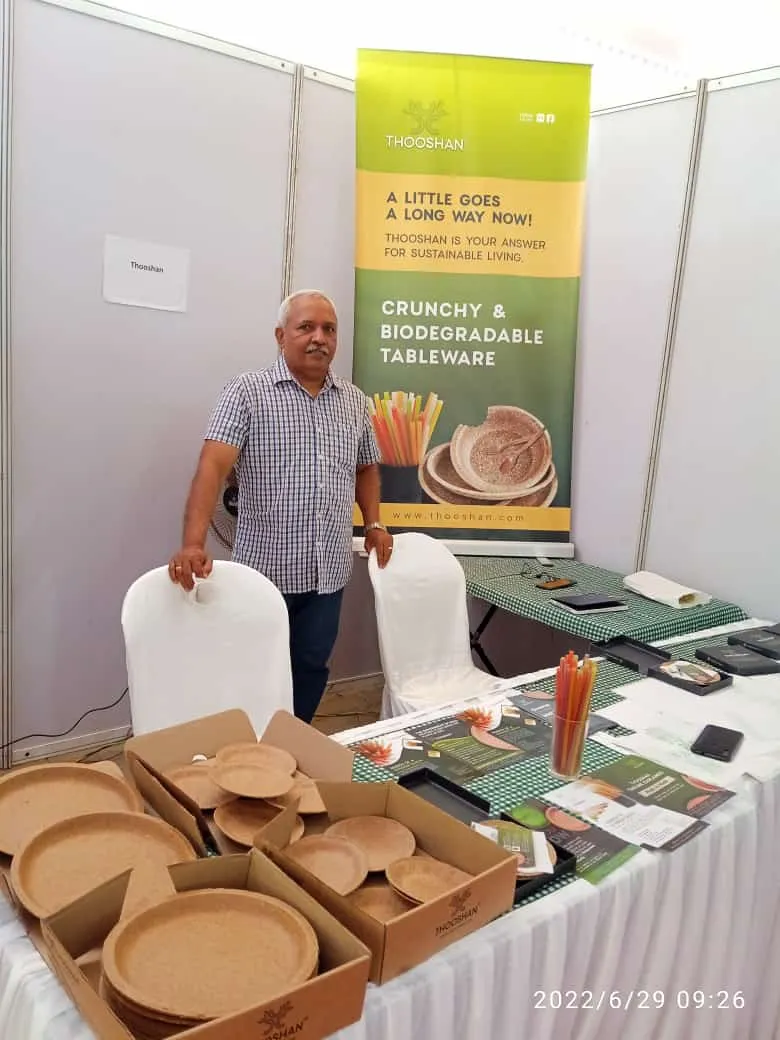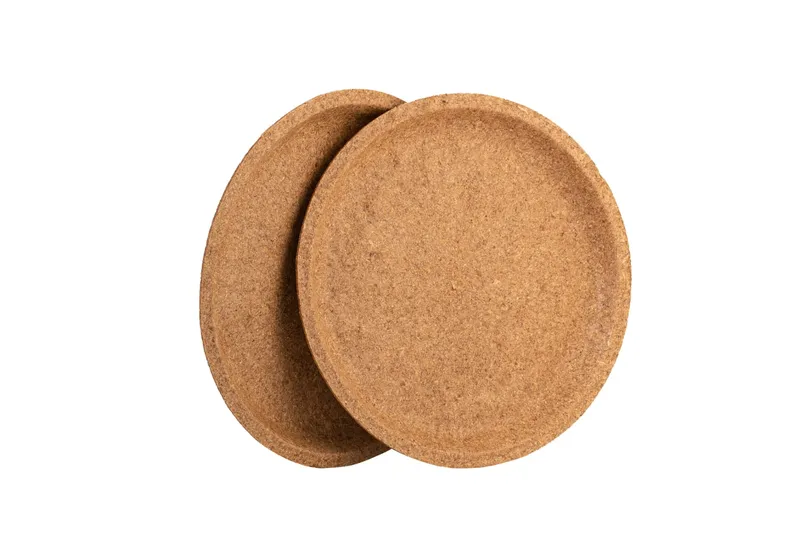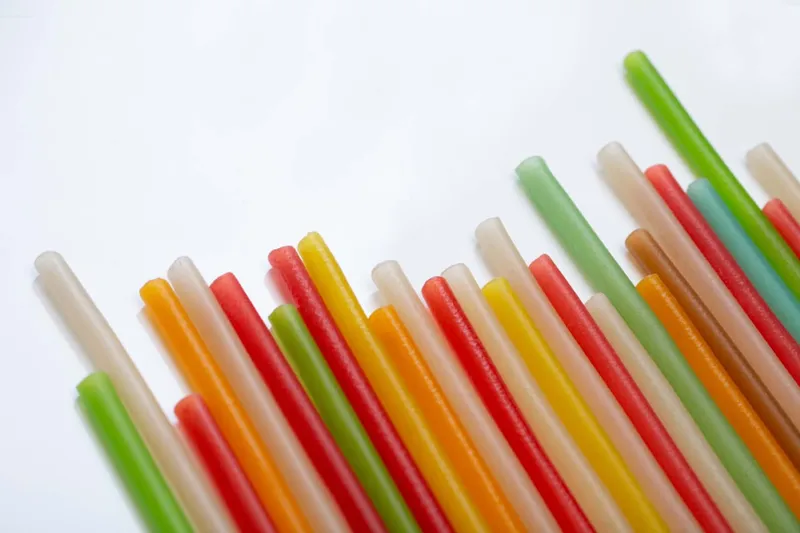Spurred by Make in India, this Kerala couple produces plates from wheat bran
Vinay Balakrishnan and his wife Indira are founders of Thooshan, a Kerala-based ecofriendly tableware brand that aims to reduce single-use plastic with plates made from wheat bran and straws from rice and tapioca.
On August 17, 2021, Vinay Balakrishnan and his wife Indira were all set to unroll the first plate made from wheat bran after almost three years of research.
However, when D-Day arrived and the wheat husk was fed into the machine, there was no output. The duo had spent close to Rs 1.5 crore on the project by then on research and machinery, in the hope that
Thooshan, their tableware brand would take off as a first-of-its kind eco-friendly product made from wheat bran.

Vinay Balakrishnan with Thooshan products
The product, researched and developed at the Council for Scientific and Industrial Research (CSIR), failed when put to its first commercial test.
“We tried everything for 10 days, scientists from CSIR and the machinery designers were here. We had fed the bran according to the conditions specified by CSIR but there was no output,” Balakrishnan recalls, speaking from the Thooshan unit in Angamaly, near Kochi.
Despite repeated failures, they did not give up.
“It took us almost a year to identify the exact permutations and combinations–even parameters that included the right temperature, moisture and other factors to make a plate,” he says.
After alterations to the machinery and many iterations in the process, finally, a plate rolled out one day. But when tested the next day, the machine did not work.
Balakrishnan then zeroed in on the problem—the difference in wheat bran.
He went to the flour mill where they sourced the wheat bran from. There, he realised, wheat from different states produced a different bran, the previous days’ batch was from Punjab, and the day’s batch was from Gujarat.
“We had to again customise and optimise the machine. After three years, now by just looking at the bran, we are able to understand what process it needs. Having a completely automated setup with minimal human intervention helped us,” Indira says.
Series of setbacks

Thooshan plates made from wheat bran
While the couple may not be the first in the world to make tableware from wheat bran, they are the only ones currently doing so.
Their passion for making eco-friendly tableware in India started with a letter to a Polish company and its refusal to share information.
“On a visit to Dubai in 2013, I came across these plates made from wheat bran. I emailed the Polish manufacturer asking for details, and if they were open to sharing the technology for its production in India. They declined, quite rudely, and this refusal spurred me to make the same in India,” he explains.
Balakrishnan was then working in Mauritius as the CEO of an insurance company after successful stints in India that included the Indian Railways, the Territorial Army, Lord Krishna Bank, IndusInd Bank, MetLife, BhartiAxa and others.
The couple returned to India in 2013, and spurred by the idea of a sustainable product, decided to research further.
But before that, they decided to take advantage of solar energy making inroads into the state, and invested Rs 1 crore in a distributorship with the American company, Borg.
Unfortunately, when they launched the distributorship in 2017, a solar scam surfaced in Kerala, which made people reluctant to invest in solar kits. The couple was left with dead stock, with no sales backup. The company eventually had to withdraw from the Indian market.
Despite the huge setback, the idea of eco-friendly tableware remained on the couple’s minds. He had already identified five kinds of raw material sources—wheat bran, rice bran, paddy husk, corn waste and sugarcane bagasse. But the Polish refusal played on his mind.
While attending an exhibition in Kochi, Balakrishnan came across plates made from coir by CSIR. He met the director of the organisation, who agreed to work on the research for the wheat bran plate, if Balakrishnan funded it.
He invested Rs 5 lakh in the research, and CSIR took three years to make a plate. Balakrishnan leaned on his engineer friends for designing the machinery and a local manufacturer to make the dyes.
The Polish company, Balakrishan says, took 17 years and a grant of 37 million euros to make the product but he managed to do so in three years, and with his own funds.
Eco-friendly alternatives

Thooshan straws made from a mix of rice powder and tapioca starch
The plate is made from fresh wheat bran sourced every day from nearby flour mills. The gluten in the bran acts as a binding agent. Without revealing much about the process, which has a patent pending in its name, Balakrishnan says each step of the process in automated. The machine rolls out a plate in about 30 seconds and the small unit has a capacity of 1,000 plates in a day.
“Since we want every part of the process to be sustainable, we don’t package them in plastic. By not using plastic, their shelf life in coastal states like Kerala, which has a high humidity rate is reduced. However, in states with dry heat like Delhi and Punjab, and in countries like the US and the UK, they can remain for six months. It all depends on the moisture in the atmosphere,” he says. The plates after use, can be used as cattle, poultry, or fish feed, as organic manure, and are entirely biodegradable.
Initially, the cost of one plate was Rs 20, but the duo now sells it for Rs 10, at cost price, with no margin.
With the ban on plastic in Kerala, Balakrishnan believes people are waking up to the idea of eco-friendly tableware. To this end, the company also manufactures straws made from rice powder and tapioca starch mix and forks made from a mix of rice bran and bioplastics, outsourced to a third-party manufacturer.
Thooshan caters to large events like eco-friendly weddings, and parties and also recently supplied tableware to G20 Sherpa Meeting in Kumarakom early this year.
“Our straws are used by all Club Mahindra properties and we are closing a deal to supply to major five-star hotel chains,” says Balakrishnan.
The recipient of many awards like the FICCI Agritech National Award, Runner-up at Climathon 2022 and National Winner of RAFTAAR ABI for Innovation in agricultural products, Government of India, Thooshan has received startup grants from Kerala Startup Mission and the UNDP Green Innovation Fund. It is also incubated at incubated at IIT-Kanpur, Kerala Agricultural University and Indigram Lab Foundation, New Delhi.
“We have been receiving a lot of inquiries for our products from India and global markets. Everyone requires huge quantities, but our production capacity cannot match the demand. We want to extend the range to include spoons and knives. We are also looking at raising funds from VCs to scale our business,” Balakrishnan says.
Edited by Affirunisa Kankudti






